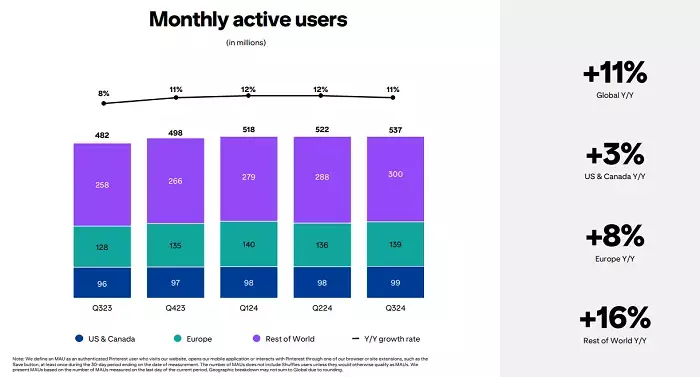In its most recent quarterly report, Pinterest has underscored a healthy rise in revenue and user engagement, setting the stage for a promising holiday shopping season. With the platform adding a staggering 15 million new monthly active users (MAU) during the third quarter, its total reached an impressive 537 million. This growth marks a notable recovery compared to Q2, where merely 4 million users were added, reflecting a more robust trajectory for the platform. While the addition of 4 million users is commendable, the leap to 15 million indicates a revitalized momentum for Pinterest’s user base, emphasizing its effective strategies in user attraction.
This uptick in growth is particularly significant, considering the challenges Pinterest faced following the initial pandemic surge in 2020. During the lockdowns, the platform benefitted from a notable increase in usage as shopping habits shifted to online platforms. Analysts speculated that this trend would lead to a long-term expansion of user engagement. However, as physical retail resumed, many consumers reverted to traditional shopping methods, leading to a dip in Pinterest activity. The platform’s current rebound, surpassing even those pandemic highs, illustrates a remarkable pivot towards a sustainable and solid growth model.
Despite these encouraging numbers, Pinterest’s growth trajectory appears to be plateauing in crucial markets such as the U.S. and the European Union. These regions contribute significantly to Pinterest’s revenue streams, yet the stagnation in user growth poses potential risks to its advertising revenue potential. Although Pinterest has successfully expanded its advertising capabilities in other markets, the lack of audience growth in these critical areas raises questions about its long-term strategy.
Many social platforms are encountering similar saturation points in Western markets, a trend that is not entirely unexpected. However, this reality places increased pressure on Pinterest to devise innovative advertising solutions that maintain user satisfaction without overwhelming them with intrusive ads. The potential for annoyance looms when brands are too aggressive in their marketing strategies, making it imperative for Pinterest to tread carefully as it seeks to enhance its profitability.
In terms of financials, Pinterest reported a revenue of $898 million for the quarter, reflecting an impressive 18% year-over-year growth. As the fourth quarter approaches, which is historically strong for retailers, Pinterest looks set for a robust conclusion to the fiscal year. The company’s ongoing emphasis on enhancing shopping features and refining digital matching tools resonates with an expanding base of users, strengthening its position in the market.
Central to its growth strategy is the development of AI-powered tools, such as “Body Type Filters,” which allow users to discover items that more accurately represent their specific body types. Additionally, Pinterest has incorporated AI into the ad creation process, providing marketers with insights that align with user behavior trends and enhancing content presentation. These improvements, however, come with increased operational costs.
Investment in Future Growth
With research and development expenses projected to skyrocket by nearly 25% in the current year, Pinterest recognizes the necessity of evolving alongside technological advancements. Competing platforms are allocating significant financial resources to AI development; thus, Pinterest must adapt to stay relevant and maximize the shopping experience it offers. Regardless of its comparatively lower budget for AI, Pinterest aims to keep pace with industry standards and deliver an increasingly enticing platform for consumers and brands alike.
The distinctive value proposition of Pinterest lies in its ability to provide not only product inspirations but also a comprehensive shopping experience. By offering a visually appealing and curated display of products, Pinterest acts as an essential destination for brands seeking broader consumer engagement. The platform’s focus on improving user experience could very well cement its role as a key player in the evolving landscape of digital commerce.
Pinterest’s current trajectory reflects a multitude of positive indicators, including rising engagement and thoughtful innovation in advertising strategies. While the platform faces hurdles in crucial markets, its commitment to enhancing user experience and maintaining a focus on core goals keeps it aligned with consumer expectations. The combination of strong revenue performance and ongoing improvements suggests that Pinterest is poised for a fruitful future as it capitalizes on the impending surge in holiday shopping and beyond. The next chapter for Pinterest hinges on balancing user growth in key regions while expanding its innovative offerings to maintain its relevance and appeal in a competitive social media landscape.


Leave a Reply